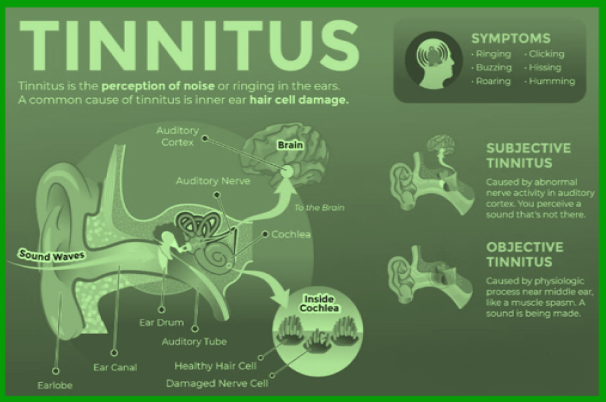Introduction
Tinnitus is a prevalent auditory condition characterized by the perception of noise or ringing in the ears without any external source. This persistent ringing, buzzing, or hissing sound can significantly impact one’s quality of life. In this detailed guide, we’ll delve into the causes, symptoms, and available treatments for tinnitus.

Tinnitus is not a disease but a symptom of an underlying issue affecting the auditory system. It can manifest as a constant or intermittent noise, often described as ringing, humming, or buzzing. This sensation can be subjective, heard only by the individual, or objective, audible to others through a stethoscope.
Causes of Tinnitus
Tinnitus can stem from a variety of factors, including exposure to loud noises, age-related hearing loss, earwax blockage, and specific medical conditions like Meniere’s disease. It’s crucial to actively identify the root cause for effective management.
- Triggered by Loud Noise
Extended exposure to loud environments, like concerts or construction sites, can actively harm the delicate structures in the inner ear, leading to tinnitus. - Hearing Loss Due to Aging
As individuals age, the sensory cells in the inner ear naturally degrade, often actively resulting in tinnitus. - Obstruction by Earwax
Accumulated earwax can actively block the ear canal, causing irritation and tinnitus. Maintaining regular ear hygiene is essential to actively prevent this.
Symptoms of Tinnitus
Tinnitus symptoms can actively vary in intensity and may be accompanied by other issues, such as dizziness or headaches. Individuals experiencing persistent noise in their ears should actively seek medical evaluation to determine the underlying cause.
While there is no cure for tinnitus, various treatments can help manage symptoms and improve overall well-being.
4. Cognitive Behavioural Therapy (CBT)
CBT is a therapeutic approach that helps individuals change negative thought patterns related to tinnitus, reducing stress, and improving their ability to cope.
- Engaging in Sound Therapy
Sound therapy actively incorporates external noises to mask or divert attention from the tinnitus sound. Common tools in sound therapy include white noise machines or hearing aids equipped with built-in sound generators.
Innovative Treatments on the Horizon
As medical research actively progresses, new and inventive treatments for tinnitus are actively emerging. While some of these approaches are still in the experimental stages, they actively offer hope for the future. - Exploring Neuromodulation
Neuromodulation actively represents a promising area of research, involving the use of electrical or magnetic stimuli to actively modulate neural activity in the auditory system. Early studies actively suggest that neuromodulation may provide relief for some individuals with tinnitus. - Utilizing Repetitive Transcranial Magnetic Stimulation (rTMS)
rTMS actively stands as a non-invasive procedure that uses magnetic fields to stimulate nerve cells in the brain. Some studies actively indicate that rTMS may positively impact tinnitus symptoms by actively altering neural activity.
6. Medications
In some cases, medications may be prescribed to alleviate the symptoms of tinnitus. However, the effectiveness varies, and potential side effects should be considered.
Certainly! Below is a comprehensive blog post on medications for Tinnitus:
Navigating Tinnitus: A Deep Dive into Medication Options
The Role of Medications in Tinnitus Management
Medications for tinnitus are often prescribed to address underlying causes or to alleviate specific symptoms. It’s essential to note that the effectiveness of these medications can vary from person to person, and consultation with a healthcare professional is crucial for personalized treatment plans.
Antidepressants
Antidepressants are sometimes prescribed to individuals with tinnitus, especially when the condition is linked to anxiety or depression. Medications like amitriptyline or nortriptyline may help regulate mood and, in turn, reduce the impact of tinnitus.
2. Antianxiety Drugs
For individuals whose tinnitus symptoms are exacerbated by stress or anxiety, antianxiety drugs such as diazepam or alprazolam may be recommended. These medications aim to relax the central nervous system, potentially lessening the perceived intensity of tinnitus.
3. Muscle Relaxants
In cases where tinnitus is associated with muscle spasms or tension in the neck and jaw, **muscle relaxants** like cyclobenzaprine may be prescribed. These medications work to alleviate muscle tightness, potentially reducing the impact on tinnitus symptoms.
4. Medications for Blood Vessel Conditions
Tinnitus linked to blood vessel conditions, such as high blood pressure, may benefit from medications that address these issues. Blood pressure medications, like ACE inhibitors or diuretics, may be considered to manage tinnitus symptoms in these cases.
Considerations and Potential Side Effects
While medications can provide relief, it’s crucial to actively be aware of potential side effects. Not everyone may respond positively to medication, and healthcare professionals actively weigh the benefits and risks.
- Engaging in Consultation with Healthcare Professionals
Before initiating any medication regimen for tinnitus, individuals should actively consult with healthcare professionals to actively determine the most suitable options based on their specific health conditions and needs.
6. Monitoring and Adjustments
Regular monitoring is essential once medication is initiated. Adjustments to the dosage or a switch to a different medication may be necessary based on how an individual responds and any observed side effects.
Frequently Asked Questions (FAQs)
Q1: Does Tinnitus Persist?
A1: Tinnitus can be temporary or chronic, depending on its underlying cause. Seeking medical advice actively plays a crucial role in obtaining an accurate diagnosis.
Q2: Can Stress Aggravate Tinnitus?
A2: Absolutely, stress and anxiety can actively worsen tinnitus symptoms. Managing stress through relaxation techniques or therapy actively may help alleviate symptoms.
Conclusion
In conclusion, tinnitus is a common condition with various causes and symptoms. While there is no one-size-fits-all solution, actively understanding the underlying factors and exploring different treatment options can significantly improve the quality of life for individuals living with tinnitus.
References
1. American Tinnitus Association. (https://www.ata.org/)
